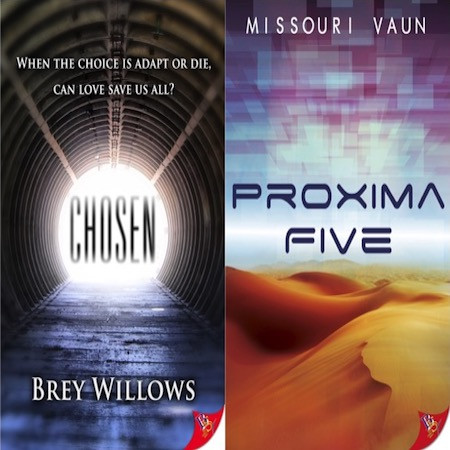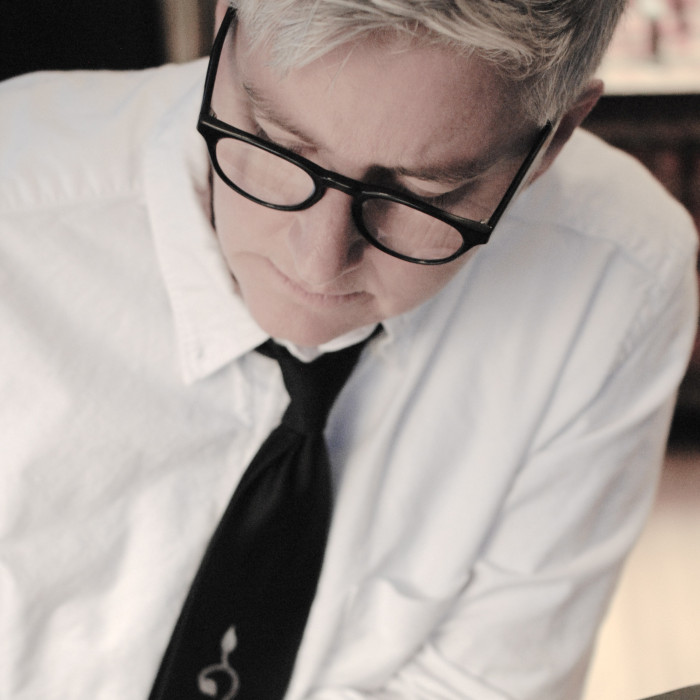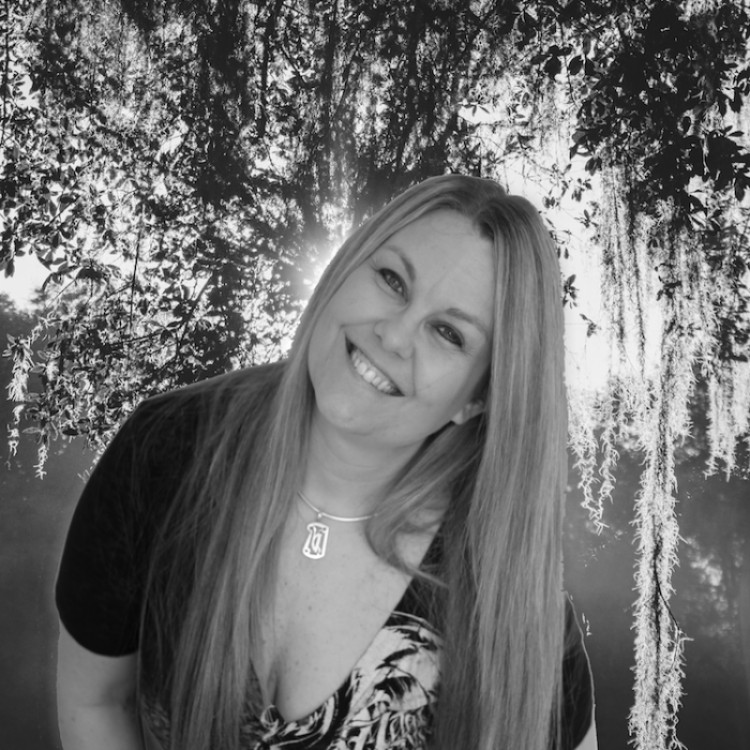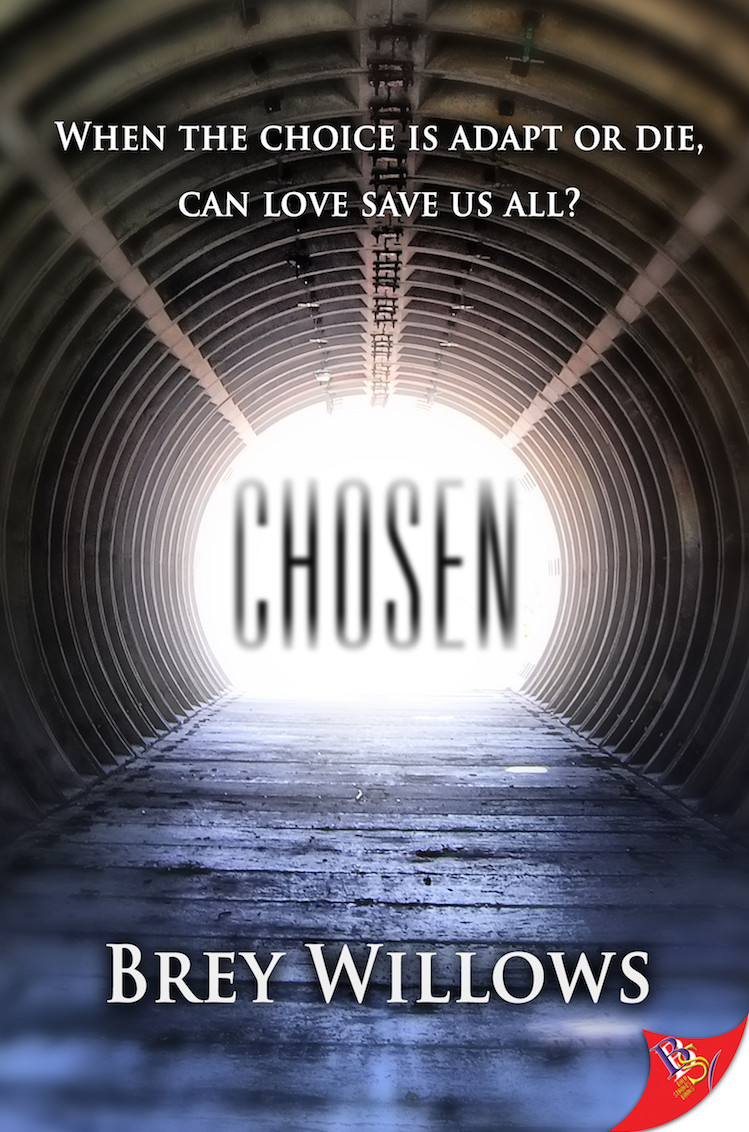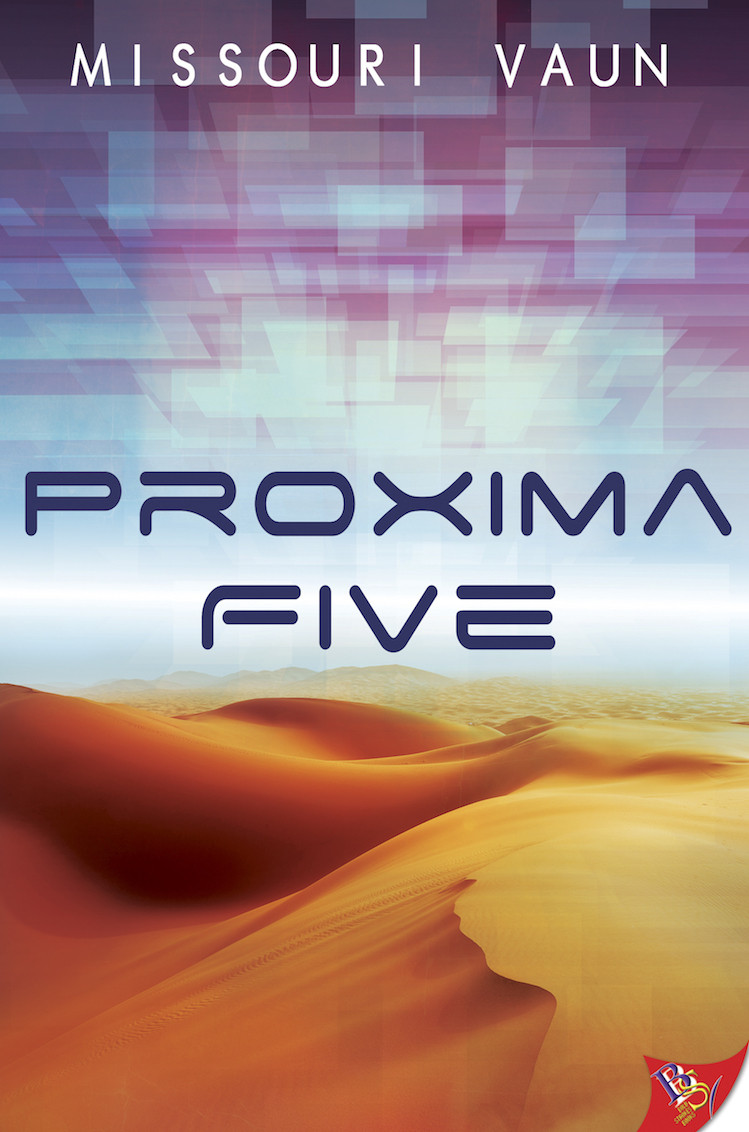Missouri Vaun and Brey Willows blog:
Vaun: This is kind of crazy, and some of you may not believe that Brey and I didn’t talk ahead of time, but we didn’t. Brey Willows and I both have new releases that could almost be part of the same series and we didn’t realize this until the books came out.
What’s sort of remarkable is that our new novels focus on a future Earth ravaged by climate change. Brey and I both envisioned a future Earth where humans leave to colonize a different planet because our home world is in rapid decline. In Brey’s Chosen, the gifted are being rounded up for a colonization project on a planet that will take twenty years to reach. In my novel Proxima Five, colonization has already happened and it hasn’t gone quite as planned.
Chosen could almost be a prequel to Proxima Five. The really interesting part of all of this is that Brey and I had no idea we were both writing different takes on the same hypothesis until the books came out September 1.
Brey lives in England and I live in California, but somehow, we both picked up the same psychic wave about one possible future for Earth. We thought it might be fun to chat about our individual journeys to Chosen and Proxima Five.
Vaun: Brey, I know you spent time in California…You used to live here, right? California, where miles and miles of oceanic coastline, droughts, and wildfires make the threat of climate change feel more imminent than possibly in other places in the world. (Although, England is an island, so maybe you guys feel it too.) Big parts of your book take place in the West. Did your time in America inform the setting for your story?
Brey: I grew up in the LA area, which is already a desert, and now we have fire season added to the regular other four seasons. A year before I left, a wildfire started and got crazy out of control. At one point, there was a fifty-mile fire line. Fifty miles of burning homes and land. It was scary, and surreal, and now it’s become more common. My research showed that by 2050, London is expected to look a lot like Venice (the Italian one, not the Californian one). Mostly underwater. So while California and the other states are my basis in the novel, the whole planet really will be affected. You’re California based, too—are you seeing the changes up there?
Vaun: Definitely with the wildfires. Also, we’ve had an extremely warm summer, which is unsettling in Northern California where you usually need a jacket almost year-round.
Brey: What’s your biggest worry about climate change?
Vaun: Water. Specifically, fresh water. A friend of mine works for NOAA and ten years ago he was worried about groundwater. Even that long ago groundwater had traces of estrogen (from birth control pills) and other chemicals, and we have no idea how those chemicals and hormones will affect humans in the long term. Not only that, but extended droughts will decrease available fresh water. Water is essentially a closed system. The water we have now is the water we had at the beginning of time. And if we destroy it with pollution and then face droughts…well, it’s not good. That’s why the wealthy are buying up water rights in South America. Water is the next oil in terms of where money will be made.
One of my favorite quotes from Norman Maclean is about water, about rivers: “Eventually, all things merge into one, and a river runs through it. The river was cut by the world's great flood and runs over rocks from the basement of time. On some of the rocks are timeless raindrops. Under the rocks are the words, and some of the words are theirs. I am haunted by waters.” (From A River Runs Through It and Other Stories, University of Chicago Press, 1976)
Brey: Wow. That’s an amazing quote. I feel the need to chew on it to really understand it fully, and it kind of leads to my next question, where you’ve drawn a really vivid world: What made you decide to begin where you did societally on your planet?
Vaun: There’s so much ground that’s already been covered in science fiction. Sometimes I like to jump ahead to phase two, the assumption being that humans will screw up this planet and set off to find a new one. The only problem, I believe, is that we won’t really change. And that’s a little of what my story is about.
Brey: Speaking of people who change…Are you Keegan? C’mon, we won’t tell…
Vaun: Ha! I wish I was that much of a badass. In terms of characters I’ve written, my wife would say that I’m most like Cole from my first novel, All Things Rise. I think she’s probably right. Cole voices a lot of my personal beliefs in that story. But I like Keegan a lot and she would kind of be my hero if I were to meet her in person.
Brey: What do you think you’d miss most if you went to live on another planet?
Vaun: Everything. Mostly, I think we live on a paradise planet…It bothers me that people take that for granted. We are not good stewards, I’m afraid.
Brey: Truth. I think you and I have both been lucky enough to do a lot of traveling, and some of the things you get to see are so awe inspiring. It broke my heart doing the research that showed so much of it is endangered.
Vaun: I think you did a great job of balancing all the pros and cons of wanting to leave the planet and wanting to remain with those left behind. You did a nice job of highlighting the thought that went into each character’s path for the choices they ended up making. No one was the villain—although, without giving away spoilers, I was rooting for a particular choice at the end and I wasn’t disappointed. Which path would you have taken personally?
Brey: Ooh. I think it would be a tough decision. I mean, both sides were valid, and that’s why I didn’t want to portray a particular villain. A lot like your book, it was about the societal expectation and acceptance that a certain group of people were more/less than, and what that means when you have to create a new society (or allow one to die). Fortunately, I’m not one of the brighter bulbs on the planet, so I wouldn’t have been chosen anyway. Would you want to leave the planet to discover a new one? Or, like in your book, do you think we’re kind of doomed to be ass-hats no matter where we are? Do you think we could ever evolve into beings who made the universe better?
Vaun: Not really. I laugh to myself about even saying that because it makes me sound like such a pessimist, when in fact I’m a complete optimist. But that doesn’t mean I’m not a realist, and if history has shown us anything, it’s that we, humans, love to repeat our mistakes. Unlike the elephants, we do not store generational knowledge for the betterment of future offspring. One of the biggest hurdles for humans is to acknowledge our selfishness and rise above it. We haven’t figured out how to do that yet.
I don’t know if you know this, but Proxima B is a real planet. It’s been referred to as “the Earth next door.” Is the colony site in your book an actual place or is that part fiction? I haven’t had a chance to look that up and I wondered.
Brey: You know, I read up on Proxima B and very nearly chose it, which would have been totally nuts. But I ended up choosing Kepler-128b, which is a real planet in the Kepler system, and they think there could be habitable planets there. It was only discovered in the last couple years, and it’s only eleven light years away. So it seemed feasible. What made you choose Proxima B?
Vaun: The fact that Proxima B is tidally locked was what made me choose it. Like our moon, one side of the planet is forever dark, one side forever light. Isn’t that kind of a great metaphor for good and evil? It’s almost too perfect. And the only habitable zone is the middle…a green zone that creates a band around the planet between the two extremes. In this way, the planet itself became a character in the story.
I thought it was really interesting that we both have lead characters who are geologists. That’s random, don’t you think?
Brey: Especially since neither of us are scientists! I think part of me is hoping that the scientists will be the ones who save the day, who finally get listened to. And really, I just wanted an outdoorsy type who liked to play with rocks and build stuff. And who could kick ass. What made you choose a geologist, specifically?
Vaun: I love rocks. And I figured a geologist would be necessary to evaluate foundational materials and sites for the infrastructure the colonists would need.
You know, speaking of our hope that scientists will ultimately save us, the jumping off point for the idea behind Proxima Five was the 2016 presidential election here in the US. The Trump administration almost immediately began to undermine the scientific community. Bullies took control, and it made me wonder what our world would look like if that power imbalance was allowed to thrive. If we continued to choose wealth and physical power over intellectual power, where would we end up? That’s the question I tried to explore in Proxima Five.
Brey: I have to admit, I’m glad I’m not living in Trump era America. The way the country is being dismantled is truly scary, and I can see where you’re coming from with Promixa Five. Does that mean that the society we see there is what we’d take with us from a Trump regime, if we were to leave during that time? The lack of science and logic would be replaced with a bully system?
Vaun: That’s where the idea for the book started. But then, I think…I hope…I expanded on that idea. As with your novel, Chosen, nothing is ever completely black and white. Life has texture and extremes and shades of gray. The challenge I presented my two main characters was to look inward, with honesty, and have the courage to change.
Brey: I wanted to explore the ethics of leaving the planet for another one. Not everyone can go, so who gets to choose who is worthy of being saved and who isn’t? We’re on heavily unequal ground all over the world right now, but it seems like money and education are always the way forward. What if you can’t afford the education and you don’t have money?
Vaun: Then you hope you’re lucky enough to have the wealth of true friends and chosen family to help you get through the tough times.
Brey: I think both of our novels end on a ray of hope. Do you think there’s hope out there?
Vaun: The optimist in me says yes.
Brey: Are you going to do a sequel to Proxima Five? I’ve been asked if I’m going to do a sequel to Chosen, but I’d really considered it a standalone. You?
Vaun: There’s definitely more story there for me. I’d love to write what comes next. I guess we’ll both have to wait and see.
I had one last question for you. I loved Karissa’s sense of humor. One line in particular made me laugh. She’s talking to Devin when she says, “That hero bullshit is really sexy overall, but right now, shut it.” I felt like I could hear your voice in Karissa, your sense of humor…Am I right about that?
Brey: I think there’s a little of us in all our characters, don’t you? ;)
